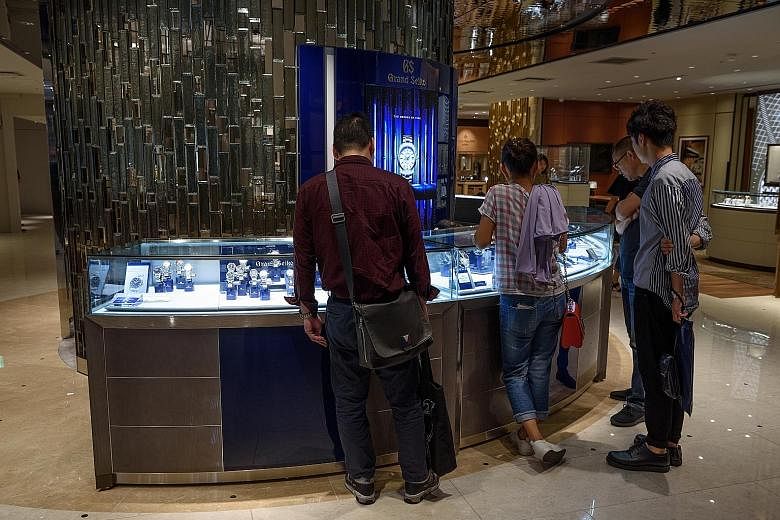TOKYO • Japan's industrial output shrank more than expected in August in the latest warning that the economy and its manufacturers are facing intensifying pressure amid a bitter trade war between the United States and China.
Retail sales, however, expanded at a faster-than-expected pace, signalling strength in private spending ahead of this month's nationwide sales tax increase.
Industrial output declined 1.2 per cent in August, government data showed, dropping at a faster pace than a median market forecast for a 0.5 per cent decline and almost completely reversing July's 1.3 per cent increase.
It was weighed down by reduced production of iron and steel products, factory production equipment and cars, offsetting a gain in electronic parts and chemicals.
Manufacturers surveyed by the Trade Ministry expect output to rise 1.9 per cent last month, but fall 0.5 per cent this month.
Yesterday's output data paints a bleak picture for Japan's export-reliant economy, underlining broadening stress across the manufacturing sector from slowing global growth, though service-sector activity remains firm as it is less at risk from weakness in global trade.
"The lack of export growth because of the global economic slowdown is having a major impact," said Shinkin Central Bank Research Institute senior economist Takumi Tsunoda. "The sales tax will be raised in October, so the deceleration of the economy will likely become stronger."
The Trade Ministry cut its assessment of activity on the whole, saying that it has been somewhat weakening recently.
The world's third-largest economy has so far avoided buckling under a slowdown in overseas demand, growing for the third straight quarter in April-June, largely thanks to robust household consumption and public works spending.
The latest data showed Japan's exports slipped for a ninth month in August as the Sino-US trade war hit demand from China and other Asian trading partners. Exports in volume terms, which strip away the exchange rate impact, also fell.
But Japanese Prime Minister Shinzo Abe has brought Japanese exporters some relief after signing a limited trade deal with US President Donald Trump to cut tariffs on US farm goods, Japanese machine tools and other products.
An upbeat sign in August factory output came from electronic parts production, which expanded for a second straight month, suggesting the global information technology cycle could be coming closer to bottoming out, said Mr Tsunoda.
"It usually expands for two to three years before getting worse for a year, and it has been contracting since around the fall of last year."
Separate data on Monday showed that domestic demand might be stronger than thought, as retail sales climbed 2 per cent in August from a year earlier, the sharpest rise since October last year, according to Refinitiv data.
The reading, which also beat a median estimate for a 0.9 per cent gain, reflected robust spending on the back of a demand surge ahead of a sales tax hike to 10 per cent from 8 per cent today, some analysts said.
Economy Minister Yasutoshi Nishimura yesterday said he would watch the impact of the tax hike and take extra measures to prop up the economy if needed. "After the consumption tax rate hike, I'll... check the economic situation closely and take additional economic measures flexibly, if necessary," he said in an address to foreign embassies' representatives in Tokyo.
To soften the blow to consumers from the hike, the Japanese government has put in place stimulus steps worth 2 trillion yen (S$25.6 billion), and will refrain from raising the tax on food and non-alcoholic beverages.
REUTERS

